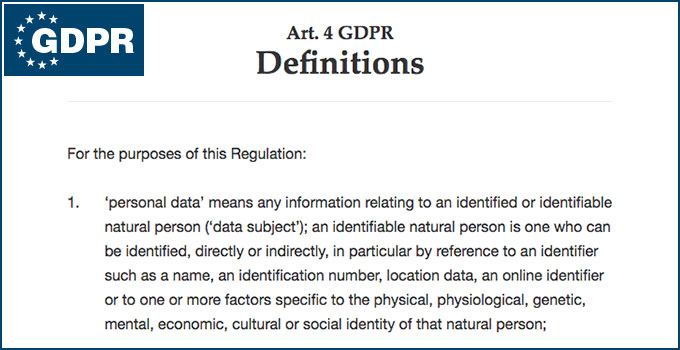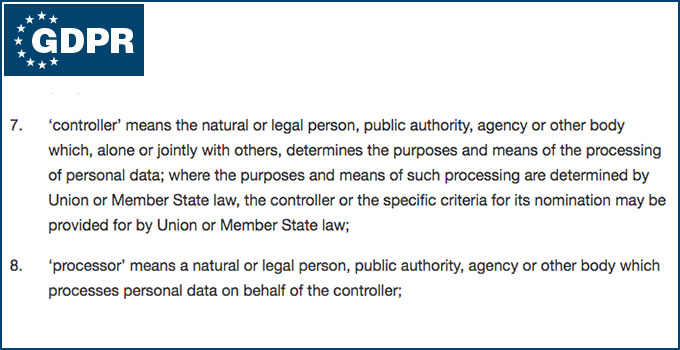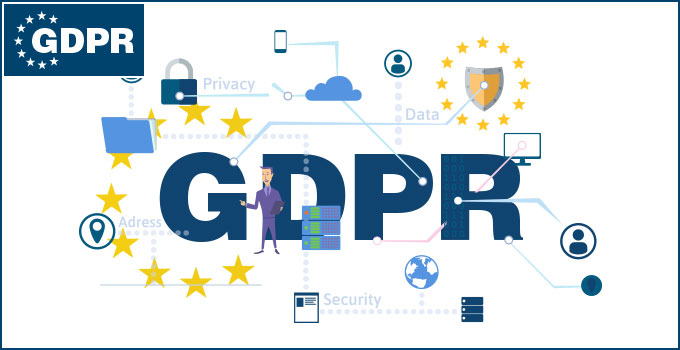What is the GDPR and what is our path to GDPR compliance?

We manage so many of our daily activities online that the web has inevitably turned into a giant pool of personal data, which is exposed to a variety of risks, as was the recent case with Facebook.
Europe’s General Data Protection Regulation (GDPR), which goes live on May 25th, is aimed at addressing all security risks by enforcing a strict data protection regulation across the EU and beyond.
Learn more about the main principles of the GDPR, how it is meant to protect data privacy and how it will affect our relationship with you and your customers.
What is the GDPR all about?
The GDPR regulation is the most impactful piece of data privacy legislation in the new century.
Coming on the heels of the recent Facebook scandal, which revealed that the data of millions of Facebook users had been misused for the sake of third-party campaigns, the GDPR regulation is designed to regain order in how personal data is handled and stored online.

Despite being an EU regulation, the GDPR practically affects any company that processes the personal information of EU citizens.
That said, it applies to whether or not that company is based in the EU.
For instance, if a US-based company provides goods or services to EU citizens, it automatically falls within the scope of the regulation.
Personal data and individual rights
Approved on April 14, 2016, the new set of rules treats personal data protection as “a fundamental right” of all EU citizens and consumers.
Regarding online services, personal data could include anything from an individual’s name to a physical location or an IP address.

The law also covers browser cookies that can track the web activity of EU individuals.
In an effort to give consumers a bit of power in the so-called “big data” world, the new regulation also gives EU individuals more rights to their information.
All EU individuals will have the explicit right to know whether, where and for what purpose their personal data is being processed.
The GDPR empowers EU individuals to have their personal data erased or not processed further.
They can also object to having their data processed for direct marketing purposes and choose to transfer it away to another provider.
Data protection responsibilities under the GDPR
The GDPR sets out the rights of EU individuals and the respective obligations of data processing companies and organizations in a total of 99 articles.
The main business takeaway is that each company will have to justify the collection of personal data and to follow very strict rules in the process.
The regulation makes a clear differentiation between companies that direct the collection of data (data controllers) and those that actually process it (data processors).

Both controllers and processors will be delegated data protection responsibilities that will make them equally pursuant to GDPR compliance audits.
The GDPR requires companies to revise and update their privacy policies and to make them clearer and more transparent to EU users.
They will need to clearly specify what personal information is collected, for what purposes it is used and what legal basis each purpose is backed up by.
Apart from justifying their data processing activities, however, companies will also need to take specific technical and organizational measures to ensure the highest level of in-house data protection.
Planned GDPR compliance measures on our platform
As a service provider operating on the European market, we are GDPR-bound by default.
Here is a list of the measures that will come into effect on the 24th of May in order to ensure GDPR compliance across our platform.
1. Privacy policy updates
The privacy policy has to mirror each given company’s approach to become GDPR-compliant.
We’ve published a revised version of the Privacy Policy for clients and a brand new Privacy Policy for resellers, which clearly specify our legal grounds for personal data processing, as well as all associated individual rights and data protection responsibilities.
2. Reseller agreement updates
We’ve also updated the Reseller Agreement that governs our relationship with you. You can review it here.
If you are using our Reseller API or are a member of the cPanel Reseller Program, you can take a look at the brand new Data Processing Agreement. It’s our new legal framework, which details how we will process your clients’ data.
3. WHOIS updates
The current public WHOIS system, which is aimed at providing free access to a domain owner’s personal information, is incompatible with the GDPR’s principles.
For that reason, registries and registrars have taken steps to hide the WHOIS details pertaining to the domains they are managing by default.
As an ICANN-accredited registrar and ‘data controller’ for .COM and .NET, we’ve taken measures to hide the WHOIS contact data for all .COM and .NET domains on our platform, in a GDPR-compliant manner.
Registrants who want their personal data to be displayed online, will be able to opt-in to having it exposed in the public WHOIS database via an explicit consent option.
It will be featured in the My Domains section of the Reseller Control Panel and the Domain Manager section of the Web Hosting Control Panel. (as a ‘Whois data disclosure consent’ option in the Edit Whois area).
Until this option becomes available online, you can ask for your registrant details to be disclosed online by opening a ticket.
4. Order form updates
Minor updates have been added to the order form to ensure that customers could consent to specific activities such as having their data stored outside the European Economic Area (EEA).
5. Reseller hosting platform updates
ResellersPanel’s reseller hosting model is not fully compatible with the GDPR’s data privacy standards.
Following a consultation with data protection advisers and learning from our industry’s best practices, we’ve had to initiate a few important, GDPR-compliant updates to our reseller hosting platform.
Those updates include:
- A revision of the List Clients section of the Reseller Control Panel, after which you will see the following per-client information: Username, Type of Service, Date of Purchase and Expiration Date;
- A revision of the client’s Control Panel when accessed from the Reseller Control Panel via the “Login as reseller” button, after which you will only see information that does not directly or indirectly identify the given client as far as their personality is concerned. Here is a quick list of the new changes:
- the following sections are no longer accessible – Change Contact Details, Change Password, Recurring, Invoices, Social Media Accounts, Feedback, Webmail, ID Protection, Wallet;
- the names of all mailboxes in the account will be hidden, with the option to change the password – disabled.
- in the File Manager section, the following options are no longer available – View, Edit, Download;
- in the MySQL and PgSQL Databases sections, the option to change the password is disabled;
- in the Registered Domains section, the option to edit the WHOIS for a domain is disabled;
- in the Remote Backups section, the “Available Accounts” list is removed;
In other words, in accordance with the GDPR regulation principles, which come into force on May 25th, you will be able to recognize your customers by the very details of the service they’ve purchased rather than by their personality.
For now, we don’t plan to stop our partners from manually creating accounts for their customers using both the public order form and the Reseller Control Panel.
If you are signing up your customers yourself, make sure that you familiarize them with the Privacy Policy and with the special, explicit-consent opt-in box for entering into a contract that will be featured on the order form starting from May 24th.
5. In-house technical and organizational measures
As mentioned earlier, the GDPR will enforce a set of data protection policies on interested companies and organizations to comply with.
They will all require a substantial investment of resources in technical and organizational data protection measures for ensuring the utmost GDPR compliance level.

We’ve done our best to create an efficient action plan that will help us implement all the newly required measures right on time.
Among them is the very method in which we communicate with the data centers that we are partnering with to ensure that they provide the necessary data protection levels.
Originally published Wednesday, May 2nd, 2018 at 11:22 am, updated July 8, 2024 and is filed under Online Security.Tags: online security


May 9th, 2018 at 1:08 pm
You’ve done a great job here explaining the changes the GDPR will bring to the RSP platform and what you are doing to get RSP compliant with the GDPR. Thanks!
From my reading of this, without our having access to the hosting clients’ personal data through the control panel, resellers will not have to register with their respective data authorities as data controllers nor come under the purview of the regulations as data processors as long as our customers sign up through the RSP-provided public order forms. Is this correct?
It is my belief that if we obtain customers’ personal data through our own activities and sign them up to RSP, we *will* be controlling/processing personal data and must register as data controllers with our relevent data authorities. It is worth mentioning this to resellers in a blog post, I think.
In respect to the above paragraph, can you confirm whether the above activity is even still possible with the newly designed RSP control panel – i.e. with the new RSP control panel can we, as we are currently able to do, sign up customers ourselves via the control panel entering in their personal data as provided to us? If we create the accounts on behalf of our customers and add the personal data ourselves into the control panel, will this personal data also be visible to us or will it also be hidden? My thoughts are that if we create the accounts on behalf of our customers, since we already hold the personal data, data for the customers we add should be visible in the clients list.
Thanks for your help.
May 9th, 2018 at 3:18 pm
Hello. Тhanks for your positive feedback! Yes, due to the strict data controlling-data processing requirements imposed by the GDPR, we’ve been forced to limit the personal data access and to take full responsibility for the data processing and protection activities on behalf of all our partners who are using our order forms. This means that if a customer signs up through the order form, you won’t have access to their private data and will not have to register anywhere, as you are not processing personal data under GDPR.
For now, we don’t plan to stop our partners from manually creating accounts for their customers using both the public order form and the Reseller Control Panel.
If you are signing up your customers yourself, make sure that you familiarize them with the Privacy Policy and with the special, explicit-consent opt-in box that will be featured on the order form starting from May 25th.
In any case, once the data has been processed by us, it will be hidden from you, since we’ll take full responsibility of its processing (as explained earlier).
May 26th, 2018 at 5:55 am
In my case, I manage many customers by logging into their account, changing email passwords, setting up FTP, doing backups, etc. Now I cannot even use the web access to their emails nor change passwords as the reseller.
In the case of shared hosting with multiple domains owned by multiple users, the problem becomes even more complex. They are not allowed to access the control panel, I do. However, I cannot directly log into their email to see what filters need to be set up, I would have to add each account to a program such as Thunderbird so I could save email data for each account. Plus, since they cannot log into the control panl and I cannot directly change their email passwords, are you expecting them to open a ticket every couple of months when they want to change their email password?
Since NONE of my customers are out side the U.S. I don’t see why this is forced upon them. They should be able to check a box allowing the reseller to work on their behalf.
I should not have to save and remember passwords for each hosting account I manage either.
Unless something can be done, I am forced to look for hosting my customers elsewhere. I’m sorry, but my business model just got very complex and not worth my time an effort.
May 26th, 2018 at 2:16 pm
This will totally make this useless as 99% of my customers rely on me to do there updates and support for them.
I am not sure what impact this will have on my customers ability to hire me as a consultant or as an administrator of there accounts but it will effect my business platform.
June 8th, 2018 at 1:56 pm
Of course they won’t respond … these blogs are always about tooting their own horn, not about practical solutions.
June 8th, 2018 at 4:46 pm
Hi guys, your concerns over the impact the GDPR may have on your business are understandable. However, the GDPR does put data processing companies at risk as far as personal details are concerned.
This is why, the only solution we could take was to limit personal data access. This applies to resellers who have neither data controller nor data processor responsibilities. Unfortunately, implementing an Allow/Disallow option like the one suggested above is not a solution, since we, as a data controller/processor, are legally responsible to ensure the privacy and security of the personal data.
So, for the time being, this is the only reasonable, GDPR-compliant solution we could think of, given the specificities of our platform.
It’s been really hard for us to take that decision. Our business will no doubt suffer a lot as well, but, after all, as a European service provider – it’s a regulation that we will need to abide by.